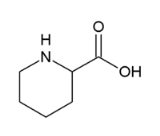
Pipecolic acidemia
Encyclopedia
Pipecolic acidemia, also called hyperpipecolic acidemia or hyperpipecolatemia, is a very rare autosomal
recessive metabolic disorder that is caused by a peroxisomal defect
.
Pipecolic acidemia can also be an associated component of Refsum disease with increased pipecolic acidemia (RDPA), as well as other peroxisomal disorders, including both infantile
and adult Refsum disease, and Zellweger syndrome
.
levels in the blood, leading to neuropathy and hepatomegaly
.
Autosome
An autosome is a chromosome that is not a sex chromosome, or allosome; that is to say, there is an equal number of copies of the chromosome in males and females. For example, in humans, there are 22 pairs of autosomes. In addition to autosomes, there are sex chromosomes, to be specific: X and Y...
recessive metabolic disorder that is caused by a peroxisomal defect
Peroxisomal disorder
Peroxisomal disorders represent a class of medical conditions caused by defects in peroxisome functions. This may be due to defects in single enzymes important for peroxisome function or in peroxins, proteins encoded by PEX genes that are critical for normal peroxisome assembly and...
.
Pipecolic acidemia can also be an associated component of Refsum disease with increased pipecolic acidemia (RDPA), as well as other peroxisomal disorders, including both infantile
Infantile Refsum disease
Infantile Refsum disease , also called infantile phytanic acid storage disease, is a rare autosomal recessive congenital peroxisomal biogenesis disorder within the Zellweger spectrum. These are disorders of the peroxisomes that are clinically similar to Zellweger syndrome and associated with...
and adult Refsum disease, and Zellweger syndrome
Zellweger syndrome
Zellweger syndrome, also called cerebrohepatorenal syndrome is a rare, congenital disorder, characterized by the reduction or absence of functional peroxisomes in the cells of an individual. It is one of a family of disorders called leukodystrophies...
.
Characteristics
The disorder is characterized by an increase in pipecolic acidPipecolic acid
Pipecolic acid is a small organic molecule which accumulates in pipecolic acidemia. It is the carboxylic acid of piperidine.It can be associated with some forms of epilepsy....
levels in the blood, leading to neuropathy and hepatomegaly
Hepatomegaly
Hepatomegaly is the condition of having an enlarged liver. It is a nonspecific medical sign having many causes, which can broadly be broken down into infection, direct toxicity, hepatic tumours, or metabolic disorder. Often, hepatomegaly will present as an abdominal mass...
.

